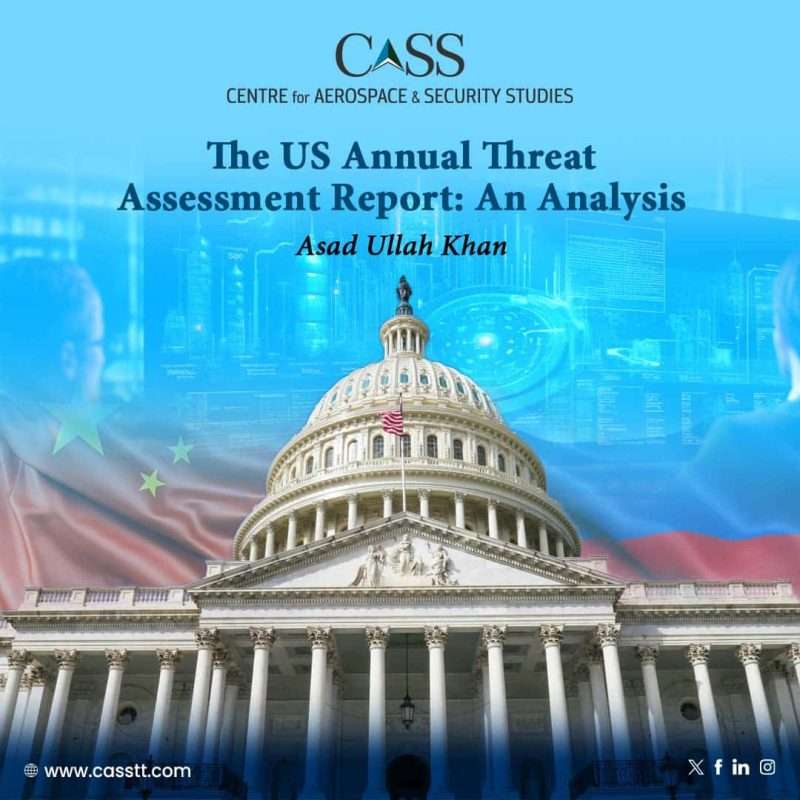The world is in flux with rapid geopolitical changes, accelerating competition, and ongoing conflicts across many regions. Amidst this backdrop, the recently released 2024 Annual Threat Assessment (ATA) of the U.S. Intelligence Community gives a bird’s eye view of US perceptions and misperceptions about the various evolving threats to its national security. The threat assessment includes both traditional and non-traditional security aspects and interestingly proposes cooperative global solutions as a response to current conflicts, mirroring the approach taken by China in addressing world issues.
While analysing the contents of the document, it becomes apparent that the primary focus of US policymakers is on threats emanating from its traditional adversaries like Russia, China, and Iran. On the Russian front, Washington is concerned that Kremlin’s pursuit of its national interests may potentially compromise the security and objectives of the US and its allies. Challenges stemming from the Russo-Ukrainian conflict and the advent of emerging technologies are expected to persist. Meanwhile, Washington also considers the Chinese Communist Party (CCP) and its domestic strength an immediate threat that has the potential to undercut American relations with its allies and promote norms that favour the Chinese authoritarian system. Also, despite slow economic growth in recent years, China’s statist economic policies, military modernisation and reliance on foreign technologies is predicted to continue. Since the US is in the midst of a presidential election, the report also expressed fears of Chinese interference via social media and cyber platforms to sway the election process. The ongoing tech war between China and US and issue of banning TikTok are examples of how the US wants to secure its digital borders from any potential external interference. This competition is likely to escalate in the coming months. Besides these two countries, Iran is likely to continue challenging US interests in the Middle East to pursue its aim of becoming a regional power.
This assessment subtly communicates several key points within the context of current developments, which are crucial to grasp. Among these, the US perspective suggests that a conflict with China in the medium term is unlikely. Beijing is predicted to reduce friction in its relations with the US to protect and pursue its core national interests in the region and beyond, and there are strong indications that it may refocus its attention on economic revival which has registered a downward trend. If this thinking spreads in US policymaking circles, it could relatively ease ongoing US-China rivalry. This may also present diverse policy avenues for countries like Pakistan to maintain a balanced approach in their relations with these great powers amid their ongoing global contestation.
In the same context, despite the ongoing Russo-Ukrainian war, the US Intelligence assesses that Russia ‘certainly does not’ want to engage in any direct military confrontation with the US and NATO forces. This implies that the US has high confidence that Moscow will not expand this conflict beyond Ukrainian borders. Therefore, the US response to the Ukraine war might change after the US Presidential elections as they do not see this conflict as a potent threat to their national interests in long run.
Furthermore, Washington’s security planners also perceive an emerging China-Russia-Iran bloc in the region. Yet, they seem not to be overly concerned, likely due to the lack of a formal alliance among these three states against the US, as well as the absence of tighter strategic and political coordination related to current regional and global conflicts. It is important to understand that beside cordial relations between Russia and China, there is no formal agreement between the two regarding military support in the ongoing Ukraine war. Barring diplomatic support, China has not provided any military support to Russia.
The ATA report also mentioned that despite strained India-Pakistan relations, ceasefire on the Line of Control (LoC) is likely to remain intact. However, on the Line of Actual Control (LAC) between India and China, the situation could become tense given the presence of heavy forces since the 2020 crisis on the border. In this context, Pakistan needs to remain vigilant as any escalation of conflict between India and China could impact the Jammu & Kashmir issue as well.
Terrorism, though a major issue in 2023, has only been discussed in the last part of the report which means that while it is a concern, it is no longer deemed a priority for 2024. This is rather surprising since as per the Global Terrorism Index Report 2024, deaths from terrorism-related incidents increased by 22% in 2023 which makes it a significant threat for the international community. Undermining this particular threat by the US intelligence community could lead to a possible miscalculation in 2024.
The 2024 US Threat Assessment Report offers insights into American strategic considerations and its domestic priorities for the year. In the election year of 2024, the US aims to lower tensions with China, Russia and Iran, seeking to avoid direct confrontations. Despite this, competition is likely to persist as the US pushes to uphold and enforce its global dominance.
Asad Ullah Khan is a Senior Research Associate at the Centre for Aerospace & Security Studies (CASS), Islamabad, Pakistan. He can be reached at [email protected].





